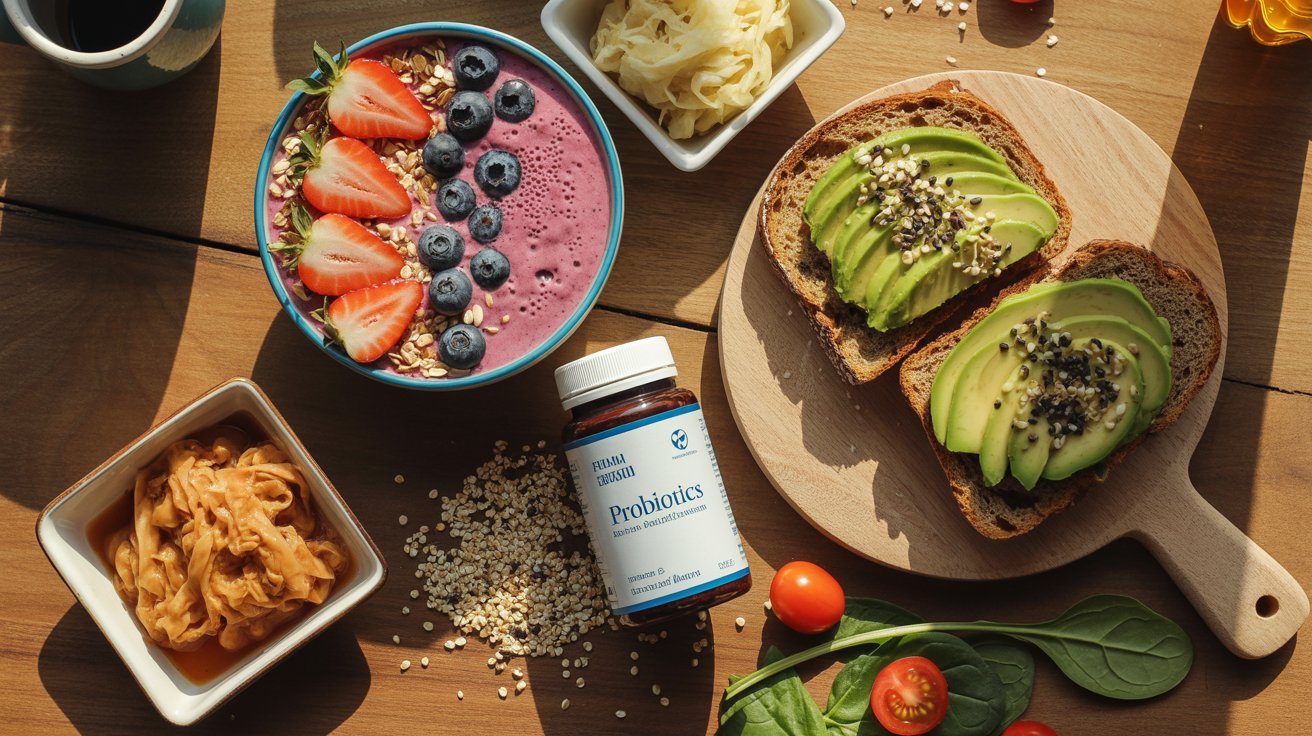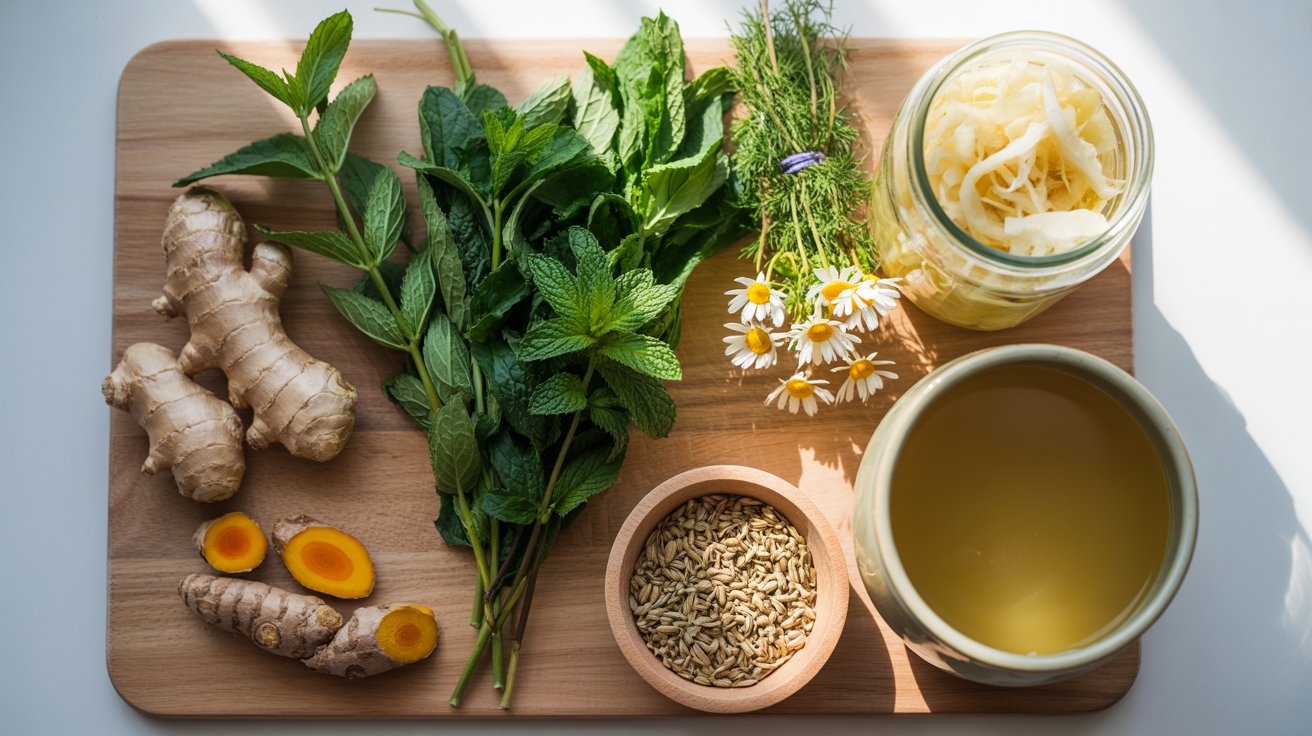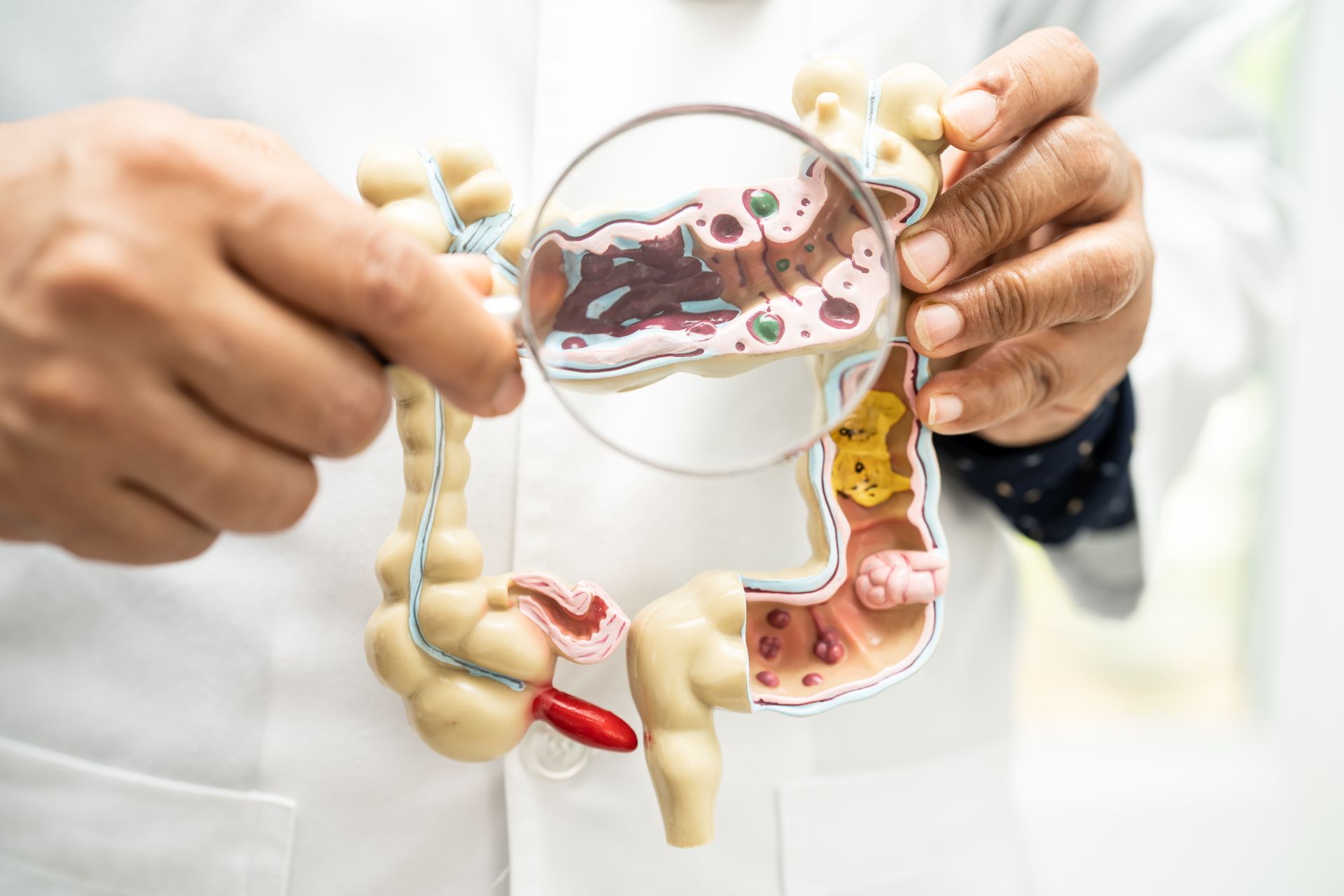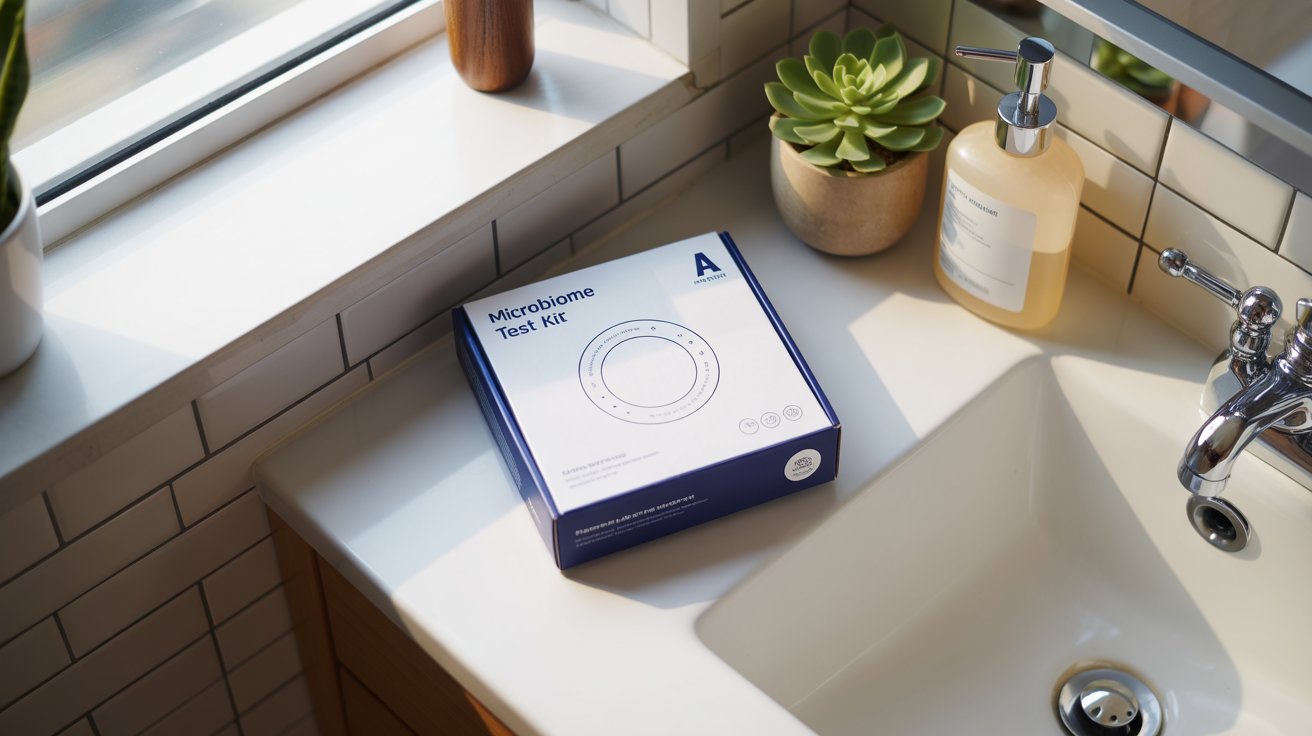In the age of Hippocrates, you wouldn’t have found a bottle of probiotics on the shelf, yet today, they’re hailed as a panacea for gut health. You’ve likely heard that these microscopic allies can transform your digestive well-being, but what’s the science behind the buzz?

From aiding digestion to potentially bolstering your immune system, the benefits seem vast. But as you stand at the crossroads of skepticism and belief, you might wonder, what’s the catch? Before you decide to incorporate probiotics into your routine, consider what lies beneath the surface of this modern elixir.
What Are Probiotics?
Probiotics are live bacteria and yeasts that are good for your digestive system, helping to balance your gut flora for better health. These beneficial bacteria reside in your gastrointestinal tract, quietly working to improve your digestive health.
You’re not alone on this journey to wellness; billions of these friendly bacteria are right there with you, ensuring your gut’s ecosystem thrives. By incorporating fermented foods like yogurt, kefir, and sauerkraut into your diet, you’re inviting these beneficial organisms into your life.
For those times when your diet mightn’t provide enough of these vital players, probiotic supplements are a great option. They’re a direct way to increase your intake of probiotics, ensuring your gut health is supported. Remember, you’re taking a step towards a healthier you by considering the role of probiotics in your diet.
What Do Probiotics Do?
Many people don’t realize that these tiny organisms play a crucial role in digesting food, absorbing nutrients, and fighting off harmful bacteria. By introducing the right probiotics into your digestive tract, you’re not just helping your body process meals more efficiently; you’re also fostering a community of beneficial microbes that stand guard against bad bacteria.
This can lead to a significant reduction in various symptoms, from bloating to more severe digestive issues, making probiotics a potential treatment option for maintaining or improving gut health. Beyond digestion, the health benefits of probiotics extend to enhancing your overall well-being, creating a sense of belonging in a community focused on nurturing good health from the inside out.
Why Does Everyone Think They Need a Probiotic?
In recent years, a surge in health and wellness trends has led many to believe they need a probiotic to maintain optimal gut health. You’re not alone if you’ve been convinced that these dietary supplements could be the key to solving a myriad of health issues. Here’s why:
- Digestive issues are becoming more common, and probiotics offer a natural solution.
- People are seeking ways to boost their immune systems, and probiotics are thought to play a critical role.
- There’s a growing understanding that a balance of bacteria in the gut is essential for overall health.
- Lastly, probiotics are seen as an easy way to introduce friendly bacteria into your diet.
Joining the probiotic movement means you’re part of a community that values health from the inside out.
How Popular Are Probiotics?

Understanding the reasons behind the growing interest in probiotics naturally leads to the question of just how widespread their usage has become. You’re not alone in your curiosity. Probiotics have surged in popularity, becoming a staple in the health and wellness community.
These beneficial supplements and food additives, celebrated for their positive impact on gastrointestinal disorders and overall human health, are now widely embraced. The beneficial effects of probiotics on gut health have propelled them into the spotlight, making them a common topic of discussion among those looking to improve their well-being.
This increasing acceptance reflects a collective acknowledgment of the crucial role gut health plays in our overall health. You’re part of a growing community that values the power of probiotics in maintaining a healthy balance within.
What Does Scientific Research Say About Probiotics?
Scientific studies have shown that probiotics can significantly benefit your gut health by improving its overall function and balance.
Here’s what research has revealed:
- Clinical trials and systematic review and meta-analysis studies confirm the positive effects of probiotics on gut health.
- Probiotics have been linked to improved outcomes in managing inflammatory bowel disease and irritable bowel syndrome.
- The safety of probiotics has been extensively studied, showing minimal risk when incorporated into your diet.
- Ongoing research suggests that regular consumption of probiotic foods can enhance the gut microbiome, fostering a sense of well-being among those who prioritize their digestive health.
When Should Someone Take Probiotics?
Deciding when to take probiotics depends largely on your individual health goals and specific conditions. If you’re seeking to support your intestinal tract’s health or aiming for the prevention of antibiotic-related issues, integrating probiotics into your routine can be beneficial.
Especially during or after the treatment of antibiotic-associated diarrhea, probiotics for people can offer relief by restoring the balance in your gut. However, it’s crucial to consult your health care provider to understand the best timing and the appropriate probiotic strain for your specific needs.
They can guide you through making an informed choice, ensuring that you’re not only nurturing a sense of belonging within your body’s ecosystem but also taking a step towards a healthier you.
What Is the Best Probiotic, if I Need One?
After consulting your healthcare provider about the timing and strain of probiotics, you might wonder which specific product stands out as the best option for your needs. Here’s a brief guide to help you feel part of a community that values health and well-being:
- Lactic Acid Bacteria: Highly recommended for general gut health, these strains are a staple in the analysis of probiotics.
- Probiotic Bacteria for UTIs: For those prone to urinary tract infections, certain strains can help.
- Health Condition-Specific Strains: Depending on your health condition, your doctor might suggest specific bacterial strains.
- Research-Backed Products: Always opt for probiotics with strong scientific backing, ensuring their effects align with your health goals.
Could Taking Probiotics Be Dangerous?
While probiotics are generally safe, it’s important to consider the potential risks they might pose to certain individuals. For some, especially those with underlying diseases, the safety of probiotics used isn’t guaranteed.
There’s a sense of belonging in taking charge of your gut health, but it’s crucial to be aware of the risks. In rare cases, probiotics can have harmful effects, contributing to conditions like antibiotic-associated diarrhea or even clostridium difficile-associated diarrhea, a more severe form of diarrhea in adults.
It’s not just about adding beneficial bacteria to your diet; it’s about understanding your body’s needs and the potential impact. Always consult with a healthcare provider to navigate the balance between harnessing the benefits and avoiding the risks of probiotics.
Are Prebiotics the Same as Probiotics?
Many people often confuse prebiotics and probiotics, though they serve different roles in supporting gut health. Here’s how they differ:
- Probiotics are live, healthy bacteria found in certain foods or dietary supplement products, designed to add or boost beneficial intestinal microbes.
- Prebiotics, on the other hand, are compounds in food that help feed those healthy bacteria or microbial communities, but aren’t alive themselves.
- Unlike probiotics, prebiotics can be found in a broader range of food items, making them an easier addition to your diet for nurturing your gut’s microbial communities.
What Are Synbiotics?
Synbiotics combine the gut-health benefits of both prebiotics and probiotics into a single product, enhancing your digestive wellness.
They foster a sense of belonging among the beneficial bacteria, ensuring your intestinal flora thrives. This harmony supports not just your gut health but also bolsters your immune and liver function, offering a shield against digestive disorders.
| Component | Benefit | Impact on Health |
|---|---|---|
| Probiotics | Boost beneficial bacteria | Enhances gut health |
| Prebiotics | Nourishes bacteria | Supports immune function |
| Synbiotics | Combines both | Improves liver function, protects against digestive disorders |
Incorporating synbiotics into your diet means you’re not just eating for one; you’re nurturing an entire community within you that’s dedicated to your well-being.
The Rise of Psychobiotics
In recent years, psychobiotics have emerged as a groundbreaking way to potentially enhance mental health through the gut-brain axis. Here’s how they could change the game:
- Function Improvement: In healthy people, psychobiotics can improve gut function, contributing to overall well-being.
- Neurological Disorders: They offer a new avenue for therapy, potentially aiding in the prevention and management of certain disorders.
- Mood Regulation: By influencing the gut-brain axis, these microbes could help regulate mood more naturally.
- Prevention Over Cure: Emphasizing prevention, psychobiotics spotlight the importance of a healthy tract in maintaining mental health.
Probiotic Foods
You’ve learned about the fascinating world of psychobiotics, but what about the actual foods that can boost your gut health?
Foods like yogurt, kefir, sauerkraut, tempeh, and kimchi are packed with probiotics that can help keep your digestive system in check.
Let’s explore how incorporating these foods into your diet can make a real difference in your overall well-being.
Yogurt

Yogurt’s live cultures make it a powerhouse for boosting your gut health. It’s not just a delicious snack; it’s your ally in maintaining a balanced digestive system. Here’s why you should incorporate yogurt into your daily routine:
- Probiotics for Adults: Yogurt is packed with beneficial bacteria that support digestive health and boost immunity.
- Reduction in Diarrhea: Studies show yogurt can significantly reduce the duration of diarrhea, especially in children.
- Acute Diarrhea Relief: Regular consumption can alleviate symptoms of acute and watery diarrhea, making it a go-to remedy.
- Diarrhea in Children: Introducing yogurt early can help prevent episodes of diarrhea, fostering a stronger gut flora from a young age.
Kefir

While yogurt is a familiar favorite for those looking to improve their gut health, kefir offers a unique set of probiotic benefits worth exploring.
Kefir’s rich probiotic content, including saccharomyces boulardii and bifidobacterium, has been shown in controlled trials to alleviate abdominal pain, reduce the incidence of infectious diarrhea, and even aid in the prevention of traveler’s diarrhea.
Furthermore, its effectiveness against diarrhea from rotavirus and in the treatment of functional constipation makes it a versatile ally in your gut health journey.
| Benefit | Probiotic Involved | Effectiveness |
|---|---|---|
| Abdominal Pain | Saccharomyces boulardii | Reduced Symptoms |
| Infectious Diarrhea | Various | Prevention & Reduction |
| Traveler’s Diarrhea | Saccharomyces boulardii | Prevention |
| Rotavirus Diarrhea | Not specified | Reduction |
| Constipation | Bifidobacterium | Functional Treatment |
Sauerkraut

Often overlooked, sauerkraut is a powerhouse of probiotics that can significantly boost your gut health. Here’s why sauerkraut should be your go-to:
- Probiotics for Maintenance: Sauerkraut is loaded with live cultures essential for your gut’s upkeep.
- Difference Between Probiotics: Not all probiotics are the same, and sauerkraut offers a unique blend beneficial for digestion.
- Probiotics Rankings: In the world of probiotics, sauerkraut ranks high due to its abundance in beneficial bacteria.
- Evidence of Probiotics in People: Studies suggest that incorporating sauerkraut into your diet can improve your digestive health and immunity.
Tempeh

Continuing our exploration of probiotic foods, let’s focus on tempeh, a fermented soy product that’s a gut health game changer. Tempeh stands as a powerful ally, especially for those with specific conditions like irritable bowel disease or those prone to gastrointestinal tract infections.
It’s remarkable how this humble food can support interventions for prevention, offering hope and a sense of community in managing health challenges.
While the Food and Drug Administration continues to study the benefits, early evidence suggests tempeh could be beneficial for probiotics for childhood, tackling issues from diarrhea to Clostridium difficile infection.
It’s even caught the eye of researchers studying non-alcoholic fatty liver disease patients, highlighting its broad potential for improving gut health.
Kimchi

Kimchi, a traditional Korean fermented vegetable dish, packs a probiotic punch that can significantly boost your gut health. When you’re exploring probiotics for induction into a healthier lifestyle, kimchi stands out as a flavorful ally. Here’s why you should consider adding it to your diet:
- Probiotics for Induction: Packed with beneficial bacteria, kimchi initiates positive changes in your gut flora.
- Treatment Duration: Regular consumption can support long-term gut health.
- Diarrhoeal Diseases: It reduces the likelihood of treatment failure against common gut issues.
- Reasonable Treatment Option: Endorsed by the US Department of Health and Human Services as a viable dietary addition for promoting gut health.
Miso

You’ll find that miso, a traditional Japanese seasoning, provides a wealth of gut-friendly bacteria essential for maintaining a balanced digestive system. This savory paste isn’t just a culinary delight; it’s a beacon for those seeking to belong to a healthier, more balanced lifestyle.
While there’s insufficient evidence to conclusively say it cures ailments, many believe in its potential benefits for conditions like ulcerative colitis and in the maintenance of remission.
It’s also thought to offer support against respiratory tract infections and may even play a role in the care for preterm infants and children with diarrhea, especially in reducing pediatric antibiotic-associated diarrhea.
Kombucha

Stepping into the effervescent world of kombucha, you’ll discover a probiotic powerhouse that’s been cherished for centuries for its digestive health benefits. Here’s why you’ll want to include it in your routine:
- Harvard Health Publishing recognizes it for promoting a healthy gut.
- Cleveland Clinic advises moderation, especially for infants and people with cancer, due to its microbial content.
- According to the US Food and Drug Administration, proper preparation and storage are key to ensuring safety.
- It can alleviate pain and discomfort associated with antibiotic treatment, by replenishing good bacteria in your system.
Pickles

Crisp, tangy pickles aren’t just a delightful addition to your meal; they’re also a powerful source of probiotics that can support your gut health.
Reviews show that these fermented delights can play a significant role in preventing disorders, including the reduction of clostridium difficile-associated diarrhea and potentially even lowering the risk of certain types of cancer. Moreover, the probiotics found in pickles are known to aid in disease prevention for induction and improve gut function in adults.
Traditional buttermilk

Just as pickles offer probiotic benefits, traditional buttermilk is another natural source that can significantly enhance your gut health. This tangy beverage isn’t just a refreshing drink; it’s packed with probiotics that can nurture your digestive system.
Here’s why you should consider adding traditional buttermilk to your diet:
- Reduces the risk of antibiotic-associated diarrhea, particularly clostridium difficile-associated diarrhea.
- Mitigates long-term effects of gut imbalance, including excessive infant crying.
- Supported by a substantial quantity of evidence, researchers like Goldenberg JZ have documented its benefits.
- Aids in the prevention of various gut disorders by maintaining a healthy balance of gut flora.
Natto

Diving into the world of fermented foods, you’ll find natto, a powerhouse of probiotics that’s been enhancing gut health for centuries. Crafted from fermented soybeans, natto is a staple in many diets, celebrated for its unique texture and flavor.
Scholars like Dalal R and Deshpande GC have highlighted its health benefits, providing a wide range of probiotics essential for your digestive system. Research, including reviews with meta-analysis by Zhang Y, underscores natto’s role in promoting remission from gut-related issues.
Some Types of Cheese

Transitioning from natto, another group of probiotic champions emerges in the form of certain cheeses, offering a delicious way to boost your gut health. You’re not alone in your quest for a healthier gut; researchers like Maher AR and Newberry SJ have pointed out the importance of probiotics. Here’s a list of cheeses that can help:
- Gouda – Rich in probiotics, as highlighted by Szajewska H’s systematic review.
- Cheddar – Alfaleh K’s probiotics research supports its benefits.
- Mozzarella – Alves de Mattos A’s probiotics findings suggest it’s a good choice.
- Cottage Cheese – Anabrees J’s probiotics studies recommend it for gut health.
Probiotic Supplements
Many people turn to probiotic supplements as a convenient way to boost their gut health. You’re part of a growing community that understands the importance of maintaining a balanced gut microbiome.
Researchers like Zhao J and Cohrssen A have explored the benefits of probiotics, contributing to our understanding. Their findings, along with others, are often compiled in resources like the Cochrane Database of Systematic Reviews, ensuring you have access to reliable information.
However, it’s crucial to note that while the enthusiasm for probiotics is well-founded, some studies highlight insufficient patient-oriented evidence. This means that despite promising results in double-blind, controlled trials, there’s still a lot to learn.
Probiotics for Kids
When it comes to children’s health, incorporating probiotics into their diet can play a key role in maintaining a balanced gut microbiome. Here’s how you and your family can benefit:
- Trial outcomes show that probiotics can significantly lower the onset of symptoms in conditions like of Clostridium difficile-associated diarrhea.
- In pre-term infants, carefully selected probiotic strains help in nurturing their developing digestive systems.
- The induction of remission in pediatric gut health issues has seen promising improvements with probiotic use, enhancing remission rates.
- Probiotics contribute to an absolute risk reduction in gastrointestinal infections among kids, fostering a stronger immune response.
Gut Health Conditions
Conditions like Clostridium difficile infection, constipation, and diarrhea induced by cancer treatment, along with diverticular disease and inflammatory bowel disease, are significant concerns.
Let’s explore how probiotics may play a role in managing these gut health issues effectively.
Clostridium Difficile Infection
Clostridium difficile, often referred to as C. diff, is a bacterium that can cause severe diarrhea and more serious intestinal conditions if it overgrows in your gut. It’s a challenging condition, but you’re not alone in facing it. Here’s what you need to know:
- Antibiotics can sometimes trigger C. diff by disrupting your gut’s natural flora.
- Symptoms include severe diarrhea, abdominal pain, and fever.
- Prevention involves careful use of antibiotics and good hygiene practices.
- Treatment usually includes specific antibiotics, but in recurring cases, probiotics or even fecal transplants may be considered.
Constipation
Moving on from the challenges of C. diff infections, it’s also crucial to address constipation, another common gut health issue that can affect your daily comfort and well-being.
Probiotics might offer some relief by helping to balance your gut flora, potentially easing the symptoms of constipation. Here’s a brief overview to get you started:
| Benefit | How It Helps |
|---|---|
| Enhances gut motility | Reduces time waste spends in colon |
| Increases stool frequency | Makes bowel movements more regular |
| Improves stool consistency | Eases passage of stool |
| Balances intestinal flora | Supports overall gut health |
| May reduce abdominal discomfort | Lessens bloating and pain |
Diarrhea Caused by Cancer Treatment
Many individuals undergoing cancer treatment experience diarrhea as a challenging side effect, impacting their overall gut health and daily activities. You’re not alone in this struggle, and understanding the situation can help you feel more in control.
- Chemotherapy and radiation often disrupt the balance of good and bad bacteria in the gut, leading to diarrhea.
- Probiotics may help restore this balance, potentially reducing the severity of symptoms.
- Hydration is crucial; diarrhea can lead to dehydration, making it essential to drink plenty of fluids.
- Dietary adjustments, like eating bland, easy-to-digest foods, can also offer relief.
Diverticular Disease
Understanding how probiotics can aid in managing diarrhea caused by cancer treatment highlights the importance of gut health, which brings us to another condition affecting the digestive system: diverticular disease.
Diverticular disease, characterized by the formation of small bulges or pockets in the lining of the digestive system, often affects the large intestine.
It’s more common as you age, but you can take steps to manage it effectively. Incorporating a diet rich in fiber and possibly including probiotics can help support your gut health, reducing symptoms and flare-ups.
Inflammatory Bowel Disease
Inflammatory Bowel Disease (IBD) is another condition that seriously impacts your gut’s health, affecting millions worldwide with its challenging symptoms. Here’s what you need to know:
- IBD includes Crohn’s disease and ulcerative colitis, each with unique challenges but shared paths in disrupting your life.
- Symptoms can vary widely, from abdominal pain to severe diarrhea. It’s a spectrum, and your experience is valid.
- Diet and lifestyle changes can make a difference. While not a cure, adjustments can help manage symptoms.
Irritable Bowel Syndrome
Irritable Bowel Syndrome (IBS) is a common gut health condition that can significantly affect your daily life. Probiotics have emerged as a promising aid, potentially bringing relief to your symptoms.
Here’s a quick look at how probiotics might help:
| Symptom | Probiotic Benefit | Outcome |
|---|---|---|
| Bloating | Reduces gas | Less discomfort |
| Constipation | Improves regularity | Smoother digestion |
| Diarrhea | Balances gut flora | More stability |
Traveler’s Diarrhea
Just as probiotics offer relief for IBS symptoms, they may also play a crucial role in managing Traveler’s Diarrhea, a common gut health challenge faced by many adventurers. When you’re exploring new cultures and cuisines, the last thing you want is for your journey to be sidelined by digestive distress. Here’s how probiotics can be your gut’s best friend on the road:
- Prevention: Taking probiotics before your trip may help fortify your digestive system against unfamiliar bacteria.
- Reduction in Symptoms: Should you encounter trouble, probiotics can lessen the severity and duration of symptoms.
- Immune Support: They bolster your gut’s immune response, potentially warding off pathogens.
- Restoration: After an episode, probiotics aid in restoring your gut flora to its pre-adventure state.
Necrotizing Enterocolitis
Turning our focus to serious gut health conditions, it’s crucial to understand necrotizing enterocolitis, a devastating disease primarily affecting premature infants. This condition, where portions of the bowel undergo necrosis, can feel isolating and frightening for families.
Sepsis in Infants
Sepsis in infants, a critical condition that can arise from or impact the gastrointestinal system. Here’s what you need to know:
- Early Detection: Recognizing the signs of sepsis early can significantly improve outcomes.
- Breastfeeding Benefits: Breastfeeding may offer protective factors that reduce the risk of sepsis in newborns.
- Hygiene Practices: Proper hygiene in handling infants is crucial in preventing infections that could lead to sepsis.
- Probiotic Potential: Research suggests that certain probiotics might help in reducing the incidence of sepsis, particularly in preterm infants.
Periodontal Diseases (Gum Disease)
Exploring the connection between gut health and oral health reveals that periodontal diseases, commonly known as gum disease, can significantly impact your overall well-being.
| Factor | Impact on Gut Health | Impact on Oral Health |
|---|---|---|
| Microbiome | Balances gut flora | Reduces harmful bacteria |
| Inflammation | Linked to several diseases | Causes gum disease |
| Nutrition | Vital for gut health | Essential for healthy gums |
| Immunity | Protects from pathogens | Fights oral infections |
| Hygiene | Prevents gut issues | Prevents periodontal diseases |
Asthma
Understanding the link between gut health and periodontal diseases sets the stage for examining how asthma, another condition influenced by our gut’s wellbeing, affects our health.
Here’s how the health of your gut might play a role in asthma:
- Gut microbiota imbalance can lead to exacerbated asthma symptoms.
- Probiotics may help in reducing the severity of asthma by balancing gut bacteria.
- Dietary changes that improve gut health could potentially lower asthma risk.
- Early-life gut health is critical; studies suggest that a healthier gut microbiome in infancy could reduce asthma development in children.
Atopic Dermatitis
Nearly everyone knows someone who struggles with atopic dermatitis, a condition where gut health plays a pivotal role.
| Gut Element | Impact on Dermatitis | Actionable Steps |
|---|---|---|
| Dysbiosis | Increases severity | Probiotic intake |
| Inflammation | Triggers flare-ups | Anti-inflammatory foods |
| Microbiome Diversity | Reduces symptoms | Diverse diet |
| Gut Barrier | Prevents escalation | Strengthen with fiber |
| Immune Response | Controls outbreaks | Balance with prebiotics |
Prevention of Allergies
Here’s how gut health intertwines with allergy prevention:
- Balancing Gut Flora: A balanced gut microbiome can strengthen your immune system, reducing allergic responses.
- Enhancing Barrier Function: Healthy gut bacteria improve the intestinal barrier, preventing allergens from entering the bloodstream.
- Regulating Immune Responses: Probiotics can help modulate the body’s immune responses, potentially decreasing the severity of allergic reactions.
- Reducing Inflammation: A well-maintained gut can lower systemic inflammation, which is often linked to allergies.
Hepatic Encephalopathy
When it comes to gut health conditions, hepatic encephalopathy stands out as a critical issue that affects your liver’s ability to remove toxins from the blood.
| Stage | Symptoms | Management |
|---|---|---|
| 1 | Mild confusion | Lifestyle changes |
| 2 | Lethargy | Medication |
| 3 | Severe confusion | Hospitalization |
| 4 | Coma | Intensive care |
Upper Respiratory Infections
Upper respiratory infections can also be influenced by the state of our gastrointestinal system. You’re not just fighting off a cold; you’re engaging in a complex battle that starts with your gut health.
Here’s how you can bolster your defenses:
- Incorporate Probiotic Foods: Yogurt, kefir, and sauerkraut can support your gut flora, indirectly boosting your immune system.
- Stay Hydrated: Fluids help maintain mucosal lining in the respiratory tract.
- Prioritize Sleep: Adequate rest strengthens your body’s natural defenses.
- Exercise Regularly: Physical activity can improve gut health and immune response.
Tending to your gut is a proactive step toward keeping those pesky upper respiratory infections at bay.
Urinary Tract Infections
Many people don’t realize that the health of your gut can significantly influence your risk of developing urinary tract infections (UTIs).
When your gut flora is balanced, it plays a crucial role in preventing harmful bacteria from overgrowing and causing infections, including those in your urinary tract.
What Should You Do Before Taking Probiotics?
Before starting a probiotic regimen, it’s crucial to consult your doctor to ensure it’s safe and appropriate for your health condition.
- Research: Dive into reliable sources to understand different strains of probiotics and their benefits.
- Evaluate your diet: Identify any dietary changes you might need to support the probiotics.
- Consider your health goals: Align probiotic choices with what you’re aiming to improve in your gut health.
- Read labels carefully: Look for probiotics with live and active cultures, and pay attention to expiration dates.
How to Improve Gut Health
Improving your gut health starts with incorporating a balanced diet rich in fiber, probiotics, and prebiotics. There’s a whole world of beneficial bacteria waiting to join forces with you. To make it more relatable, here’s a quick guide:
| Food Type | Examples | Benefits |
|---|---|---|
| High Fiber | Fruits, Vegetables | Feeds good bacteria |
| Probiotics | Yogurt, Kefir | Adds good bacteria |
| Prebiotics | Garlic, Onions | Fuels good bacteria |
Frequently Asked Questions
How Can Probiotics Affect Mental Health and Mood?
95% of your serotonin is produced in your gut. Taking probiotics can boost your mood and mental health by balancing your gut flora. You’ll feel more connected and balanced overall.
Can Probiotics Help With Weight Management or Obesity?
Yes, you might find that probiotics help with weight management or obesity. They can balance your gut flora, potentially leading to weight loss and better metabolism. It’s worth exploring if you’re seeking healthier weight options.
Are There Specific Probiotic Strains That Are Better for Skin Health, Such as Acne or Eczema?
Yes, certain probiotic strains can be your skin’s best friends, fighting acne and eczema. Lactobacillus and Bifidobacterium are like secret agents, working undercover to soothe and protect your skin, making you feel more connected and confident.
How Do Probiotics Interact With Antibiotics, and What Is the Recommended Timing for Taking Them Together?
When you’re taking antibiotics, they can disrupt your gut flora. Probiotics help maintain balance, but you should take them a few hours apart from your antibiotics. This timing ensures both treatments work effectively for you.
Can Long-Term Use of Probiotics Lead to Antibiotic Resistance or Affect the Body’s Natural Microbiome Balance?
Long-term probiotic use doesn’t typically lead to antibiotic resistance or upset your body’s natural balance.















